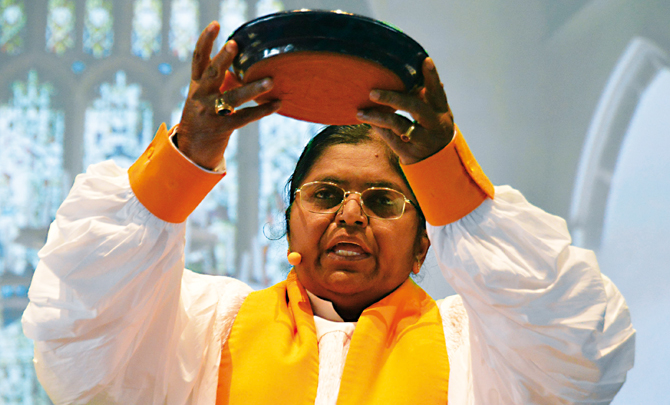Interview: Marked from the womb - Reform Magazine
Bishop Eggoni Pushpa Lalitha talks to Stephen Tomkins about spirituality and solidarity
Eggoni Pushpa Lalitha became the first female bishop in Asia from the Anglican Communion when she was consecrated bishop of Nandyal on the feast of St Michael and All Angels in 2013, before a crowd of 6,000 people. Thirty years before, she was one of the first three female priests in India, when they were ordained together in 1983.
The Church of South India, though part of the Anglican Communion, is a united Church, formed in 1947 by the union of Churches from Anglican, Methodist, Congregational, Presbyterian and other backgrounds. The largest Protestant Church in India, it has four million members in 15,000 congregations, overseen by 24 bishops. It runs more than 2,000 schools and more than 100 hospitals.
Reform talked to Bishop Lalitha, in her fourth language, at Greenbelt festival in Northamptonshire in August, where she gave a talk titled: “Leadership From The Margins” and presided over the Communion service.
Your parents were Christians. Had they grown up in the faith themselves, or were they converts?
By birth, my mother was a Christian; my father was a Hindu. My grandfather – my mother’s father – had two sons and only one daughter, so he said: “If you want your son to marry, he must become a Christian, or I’m not going to give him my daughter.” So my father was baptised and married as a Christian.
But on my mother’s side, the Christianity came long before. My grandfather’s house was right next to the church and he went to the missionary school. So he was a strong Christian. His name was David.
Your family were also members of the Dalit community. Can you tell me what it was like growing up in that community?
According to Hinduism, they are outcasts and untouchables. In ancient times it was very horrible, but, by the grace of God, the Gospel has transformed our society from darkness to light. Not only through the Gospel: The missionaries took care of education and health in our caste, so, in the modern age, we became the centre of society – scientists, doctors, engineers, all these belong to the Dalit Christians. We are grateful to the missionaries, because otherwise we would be in the corner of the village, but through the Gospel we are in the town centre.
Most Christians in India are Dalits?
Predominantly. My diocese is almost only Dalits.
How active is the caste system today?
Outwardly the caste system is not prevailing. But deep in minds and hearts it is still hanging, you can still find it – going to university they do not have priority, they get lower marks. But in rural villages it is prevailing…
____
This is an extract from the November 2015 edition of Reform.












Submit a Comment